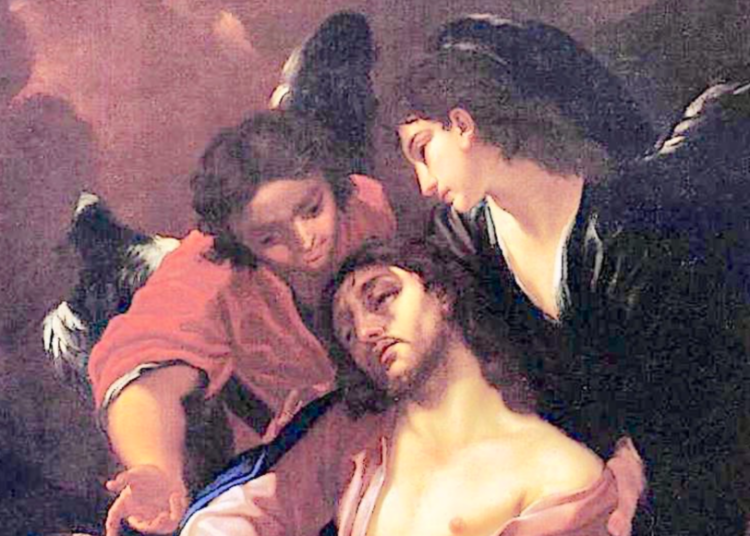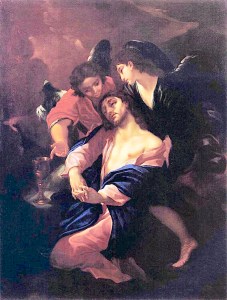I went with Peter to make the arrangements for the Passover supper. When we arrived in Jerusalem, Jesus had told us to look for a man carrying a pitcher of water. We were to follow him into the house he entered, ask to speak to the owner, and say: “The master asks you where is the room for him to eat the Passover with his disciples?” Jesus was always giving us assignments like this, which always worked out, much to our amazement. This was no exception. The owner took us upstairs and showed us a nice, large furnished room, that opened to a beautiful view of the city. We thanked him and purchased the food and wine for the evening: unleavened bread, lamb, and bitter herbs, just like those Moses and the Israelites had eaten on the night the angel of death passed over them on their Exodus from slavery in Egypt.
When the twelve disciples gathered around Jesus that night, as he gave us bread, he said something we didn’t understand. “I have longed to eat this Pasch with you before I suffer, because I shall not eat it until it is fulfilled in the Kingdom of God.” What could that mean? He took the cup, and said, “This is my blood. Take this—share it—because I shall never drink wine again until the Kingdom of God comes.” We had been a festive mood since the hosannas on Sunday as Jesus entered Jerusalem to the waving of palms, but he was now sober and reflective as he uttered these words. He took the bread and broke it, handing it to each of us, saying, “This is my body,” and he asked us to partake of his body in the new covenant. The image of his body broken for us stopped me completely with the realization that this was no mere metaphor. The body of Jesus would be broken. He talked about many more things that puzzled us. Then He prayed for us long and fervently that we would be one, as he and the Father are one. He prayed for those who would believe through us in the days to come, that they too would be one in the Father, united as Jesus is one with the Father and the Holy Spirit.
During the Transfiguration, Peter, James, and I had heard the voice of the Father and had gotten a glimpse of the dove of the Holy Spirit on the mountaintop, as Jesus hovered above us in dazzling white, conversing with Elijah and Moses. It was overwhelming to the senses and the mind. Just as Peter, James, and I thought we could take in no more, suddenly only Jesus was with us, clothed in ordinary garb, as if nothing unusual had happened. But we had seen it! Had he shared this glimpse to prepare us for what was to come? If so, what did it all mean? Years later, looking back, I wondered if we had just seen the intersection of the heavenly and earthly realms.
We walked with Jesus to the Mount of Olives, where we had gone with him other evenings when we were in Jerusalem. Jesus seemed to feel at home there, perhaps closer to his father somehow, as he looked out across the city to the valley, and beyond into the desert. Cicadas hummed in the blue velvet night. A dog yapped in the distance, answered by the howl of another. Several of the disciples had been singing psalms as we walked over from dinner in the upper room, psalms we always sang for Passover. These words recalled the mighty deeds of God the night that the blood of the lamb above the doors of the Israelites marked the homes that would be spared by the angel of death. I hummed along as we settled into chosen spots in the garden, watching Jesus intently. He was deeply focused in his thoughts, which were impenetrable, even though I knew him so well.
Jesus asked Peter, James, and me to come with him as he walked a few steps away from the others. We settled into the soft grass, which was already wet with evening dew. It was as if the garden wept. Jesus knelt down and began to pray to his Father, as we had seen him do so many times before. But this time it was different, somehow. He opened his palms and turned his face up to the starry heaven in the night sky, imploring his Father with words we could barely hear. I moved a little closer to listen, my spirit drawn to his. I sensed an urgency I had never seen in Jesus. The was the same man who had commanded the waves of the storm to be calm, who had healed the sick and made a blind man see, who brought our friend Lazarus out of his tomb four days dead, trailing his grave clothes behind him. This same man was imploring God the Father in anguished words I moved in to hear. In a groan from his depths, Jesus spoke: “Father, if you are willing, take this cup away from me.” He stopped, and the silence was deafening. I held my breath, and so did he. Seconds passed. Finally, Jesus spoke again, plaintively: “Father, if it is possible, let this cup pass me by.” As we waited for an answer, a snake slithered through the blue-green grass. Still, no sound came from heaven or from the lips of Jesus.
The other disciples had drifted off to sleep and I struggled to keep my eyes open. Jesus walked back to the others, disappointed that they did not keep vigil with him. “Did you not find the strength to stay awake one hour with me?” he asked, pained Jesus returned to pray again with increasing fervor. “Father, if it is within your will, I beg you, take this cup from me.” He prayed so intensely that he sweated. As he prayed even longer, his sweat turned to blood and his body began to sway. He was shaking. From the thin blue night air, two angels suddenly materialized next to him. One held Jesus, propping up his swaying body against his own, while the other angel soothed the furrowed, sweating brow with a cooling ointment, perfumed with wildflowers and frankincense. I watched in wonder, my eyes growing heavier from the scent, which was intoxicating, sweet, and pungent. I would have succumbed completely to sleep had I not heard the sharp, urgent tone of Jesus, as he prayed to his Father again.
Once more, Jesus spread open his arms, palms up, outstretched to heaven. In anguish, he cried, “Father, if you are willing, please take this cup away from me.” He paused. Surely a loving father would not want his son to suffer, I thought. Surely he has the power to stop the Pharisees with one mighty blow and annihilate the enemies of Jesus. He could send lightning bolts to incinerate the Roman occupying forces. Surely God the Father could unleash a mighty show of power in defense of his perfect and beloved son, demonstrating his victorious right hand! But no sign came. The silence was perfect, deafening in its oppressiveness. On this pause would hinge all of salvation history, I later thought, remembering this scene.
Finally, Jesus spoke, slowly and deliberately: “Nevertheless, let your will be done, not mine.” He continued to pray, still producing profuse sweat mingled with blood. He wrestled in agony with the burden of his mission, his love for the men and women whose lives he had touched. He had formed us as apprentices, apostles, to be sent to the far reaches of the world. Three long years he had done intensive training with us, and yet it was clear that we comprehended so little. Another wave of bloody sweat cascaded from the brow of Jesus. And as he wrestled with the future of his precarious mission to the world, he walked back to his sleeping disciples and chastised them for abandoning him. Despite my best efforts, it was then that I succumbed to sleep along with them.
Jesus spoke: “Look at them now, every one of them is asleep, even my beloved John, as I am about to enter into the struggle of my life, even with death itself, the fulfillment of all the prophecies, the realization of the plan of salvation history. Everything we planned since the beginning of time—the Father and the Holy Spirit and I together—hinges on what happens now. And my men, my hand-picked ambassadors to the world, are all out. Unconscious. Unable to muster enough commitment to stay with me while I pray. The desolation of their abandonment is a desert to my soul. How is it that the people I have come to save cannot muster a modicum of commitment to stay with me? Have I not taught you well enough? My anguish only intensifies in the silence. Yet this battle is far from over. The worst is yet to come. And I feel utterly alone.”
The serpent hissed at Jesus, then spoke, mocking him: “Where are your followers now? How can you save a world where not even these straggling human beings care enough to stay awake with you? It is futile. You should give up now. It is over.”
In one swift move, the foot of Jesus came down on the head of the serpent, crushing it. In one swift move, he fulfilled the prophecy made in the Garden of Eden. Eve’s fateful bite of the apple and her “no” to God had been reversed by Mary, who said “yes” to God. And Jesus, as the new Adam, would reverse the curse of original sin: “I will put enmity between you and the woman and between your offspring and hers; He will bruise your head and you will strike his heel.”
But the suffering Jesus would endure—to pay the overwhelming price of all man’s sin—had just begun, and it was about to become much worse, as he entered into the terrible Friday we call Good.
This essay was first published here in March 2018.
The Imaginative Conservative applies the principle of appreciation to the discussion of culture and politics—we approach dialogue with magnanimity rather than with mere civility. Will you help us remain a refreshing oasis in the increasingly contentious arena of modern discourse? Please consider donating now.
The featured image is “Christ in the Garden of Gethsemane” (c. 1650) by Giacinto Brandi (1621-1691), courtesy of Wikimedia Commons.



